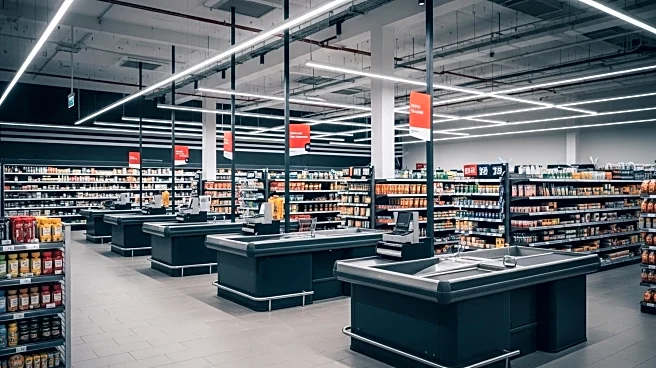What's Happening?
Amazon is set to close four of its Southern California Amazon Fresh grocery stores, with the e-commerce giant explaining that some locations are performing significantly better among customers than others. The closures include stores in La Habra, La Verne, Mission Viejo, and Whittier. Amazon spokesperson Lauren Snyder confirmed the decision, stating that the company continues to invest in making grocery shopping easier, faster, and more affordable across its 600 physical stores under the Whole Foods Market and Amazon brands. The closures follow Amazon's recent announcement of combining its Amazon Fresh and Happy Belly brands into one grocery essentials collection called Amazon Grocery.
Why It's Important?
The closure of these Amazon Fresh stores highlights the challenges faced by physical retail locations in adapting to consumer preferences and market dynamics. As Amazon evaluates its store performance, the decision to close underperforming locations reflects a strategic focus on optimizing its retail footprint. This move may impact local economies and employment, as affected employees will need to seek new positions within Amazon or elsewhere. The consolidation of grocery brands into Amazon Grocery suggests a streamlined approach to product offerings, potentially enhancing customer experience and operational efficiency. The closures also underscore the competitive pressures in the grocery sector, where online and physical retail must coexist effectively.
What's Next?
Amazon plans to work closely with employees at the closing locations to help them find new jobs within the company. Customers in the affected areas can continue shopping for groceries online, utilizing Amazon's Same-Day Delivery, Amazon Fresh, Whole Foods Market, and grocery partners. The company aims to expand its same-day delivery service to over 2,300 cities and towns by the end of 2025, potentially increasing its market reach and customer base. As Amazon continues to refine its grocery strategy, further adjustments to its store network and product offerings may occur, driven by consumer demand and competitive dynamics.
Beyond the Headlines
The closures may prompt discussions about the sustainability of physical grocery stores in the digital age, where convenience and speed are paramount. Amazon's approach to integrating online and offline shopping experiences could serve as a model for other retailers seeking to balance these aspects. The impact on local communities and the broader retail landscape will depend on how effectively Amazon manages the transition and supports affected employees.









